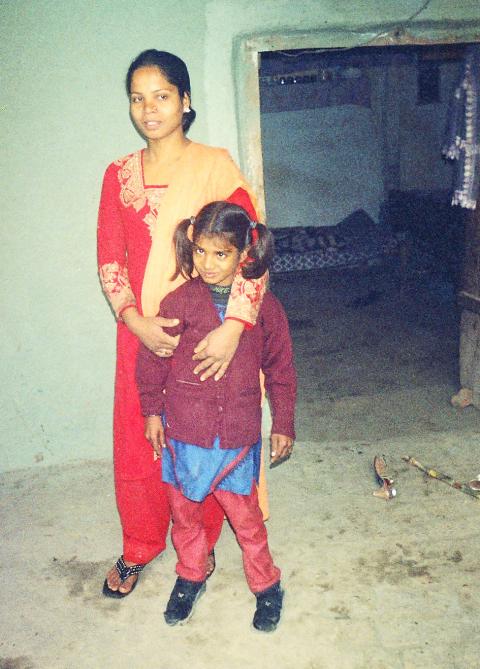The Pakistani Supreme Court yesterday freed a Christian woman from a death sentence for blasphemy against Islam and overturned her conviction, sparking angry protests and death threats from an ultra-religious party and cheers from human rights advocates.
Asia Bibi, a mother of four, had been living on death row since 2010, when she became the first woman to be sentenced to death by hanging under Pakistan’s draconian blasphemy laws, which critics say are too harsh and often misused.
She was condemned for allegedly making derogatory remarks about Islam after neighbors objected to her drinking water from their glass because she was not Muslim. Bibi has always denied blasphemy.

Photo: Reuters
The case outraged Christians worldwide and has been a source of division within Pakistan, where two politicians who sought to help Bibi were assassinated.
Chief Justice Saqib Nasir, who headed a special three-person bench set up for the appeal, cited the Koran in his ruling, writing “Tolerance is the basic principle of Islam,” and noting the religion condemns injustice and oppression.
Bibi appeared to be in state of disbelief after hearing that Nisar had quashed her conviction.

Photo: EPA-EFE / Bibi family handout
“I can’t believe what I am hearing, will I go out now? Will they let me out, really?” Bibi told Agence France-Presse by telephone from prison after the ruling. “I just don’t know what to say, I am very happy, I can’t believe it.”
Supporters of the Tehreek-e-Labaik (TLP), which was founded to support blasphemy laws, immediately condemned the ruling and blocked roads in major cities, pelting police with stones in Lahore.
The TLP’s leadership called for the death of Nasif and two other judges on the panel.
“The patron-in-chief of TLP, Muhammad Afzal Qadri, has issued the edict that says the chief justice and all those who ordered the release of Asia deserve death,” party spokesman Ejaz Ashrafi said.
The party also called for the ouster of the new government of Pakistani Prime Minister Imran Khan.
The TLP was founded out of a movement supporting a bodyguard who assassinated Lahore provincial governor Salman Taseer for advocating for Bibi in 2011. Federal minister for minorities Shahbaz Bhatti was also killed after calling for her release.
Bibi’s lawyer yesterday called the court ruling “great news” for Pakistan.
“Asia Bibi has finally been served justice,” Saiful Mulook said. “Pakistan’s Supreme Court must be appreciated that it upheld the law of the land and didn’t succumb to any pressure.”
Street protests and blockades of major roads were spreading by mid-afternoon, paralyzing parts of Islamabad, Lahore and other cities.
Some schools in Islamabad sent students home early and long lines of cars formed at gasoline stations as residents worried about prolonged protests.
Insulting Islam’s prophet is punishable by death under Pakistani law and blasphemy accusations stir such emotions that they are almost impossible to defend against.
Dozens have been killed following blasphemy claims, sometimes by mobs of men.
Rights groups say the blasphemy law is exploited by religious extremists as well as ordinary Pakistanis to settle personal scores. The law does not clearly define blasphemy and evidence might not be reproduced in court for fear of committing a fresh offence.
Bibi’s representatives have claimed she was involved in a dispute with her neighbors and that her accusers had contradicted themselves.
Christians make up only about 2 percent of Pakistan’s population and are sometimes discriminated against.
“This is a landmark verdict. For the past eight years, Asia Bibi’s life languished in limbo,” said Omar Waraich, deputy South Asia director for Amnesty International.
“The message must go out that the blasphemy laws will no longer be used to persecute the country’s most vulnerable minorities,” he said.
Additional reporting by AFP

POLITICAL PRISONERS VS DEPORTEES: Venezuela’s prosecutor’s office slammed the call by El Salvador’s leader, accusing him of crimes against humanity Salvadoran President Nayib Bukele on Sunday proposed carrying out a prisoner swap with Venezuela, suggesting he would exchange Venezuelan deportees from the US his government has kept imprisoned for what he called “political prisoners” in Venezuela. In a post on X, directed at Venezuelan President Nicolas Maduro, Bukele listed off a number of family members of high-level opposition figures in Venezuela, journalists and activists detained during the South American government’s electoral crackdown last year. “The only reason they are imprisoned is for having opposed you and your electoral fraud,” he wrote to Maduro. “However, I want to propose a humanitarian agreement that

ECONOMIC WORRIES: The ruling PAP faces voters amid concerns that the city-state faces the possibility of a recession and job losses amid Washington’s tariffs Singapore yesterday finalized contestants for its general election on Saturday next week, with the ruling People’s Action Party (PAP) fielding 32 new candidates in the biggest refresh of the party that has ruled the city-state since independence in 1965. The move follows a pledge by Singaporean Prime Minister Lawrence Wong (黃循財), who took office last year and assumed the PAP leadership, to “bring in new blood, new ideas and new energy” to steer the country of 6 million people. His latest shake-up beats that of predecessors Lee Hsien Loong (李顯龍) and Goh Chok Tong (吳作棟), who replaced 24 and 11 politicians respectively

Young women standing idly around a park in Tokyo’s west suggest that a giant statue of Godzilla is not the only attraction for a record number of foreign tourists. Their faces lit by the cold glow of their phones, the women lining Okubo Park are evidence that sex tourism has developed as a dark flipside to the bustling Kabukicho nightlife district. Increasing numbers of foreign men are flocking to the area after seeing videos on social media. One of the women said that the area near Kabukicho, where Godzilla rumbles and belches smoke atop a cinema, has become a “real

‘WATER WARFARE’: A Pakistani official called India’s suspension of a 65-year-old treaty on the sharing of waters from the Indus River ‘a cowardly, illegal move’ Pakistan yesterday canceled visas for Indian nationals, closed its airspace for all Indian-owned or operated airlines, and suspended all trade with India, including to and from any third country. The retaliatory measures follow India’s decision to suspend visas for Pakistani nationals in the aftermath of a deadly attack by shooters in Kashmir that killed 26 people, mostly tourists. The rare attack on civilians shocked and outraged India and prompted calls for action against their country’s archenemy, Pakistan. New Delhi did not publicly produce evidence connecting the attack to its neighbor, but said it had “cross-border” links to Pakistan. Pakistan denied any connection to